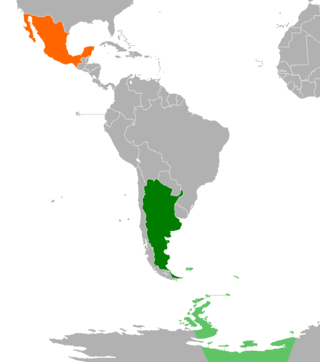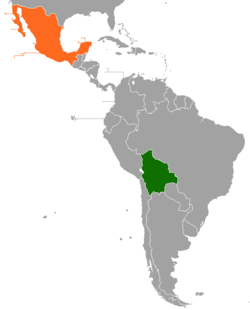
Bolivia–United States relations were established in 1837 with the first ambassadorial visit from the United States to Peru–Bolivian Confederation. The Confederation dissolved in 1839, and bilateral relations did not occur until 1848 when the United States recognized Bolivia as a sovereign state and appointed John Appleton as the Chargé d'Affaires.

The nations of Argentina and Mexico established diplomatic relations in 1888. Both nations are members of the Community of Latin American and Caribbean States, G-20 major economies, Latin American Integration Association, Organization of American States, Organization of Ibero-American States and the United Nations.

The foreign policy of the Evo Morales administration concerns the policy initiatives made towards other states by the former President of Bolivia, in difference to past, or future, Bolivian foreign policy. Morales' foreign policy can be roughly divided between that of the Americas and the rest of the world.

The nations of Mexico and Uruguay established diplomatic relations in 1831. Both nations are members of the Latin American Integration Association, Organization of American States, Organization of Ibero-American States and the United Nations.

Peru–Uruguay relations are the diplomatic relations between the Republic of Peru and the Oriental Republic of Uruguay. Both nations are members of the Cairns Group, Community of Latin American and Caribbean States, Group of 77, Latin American Integration Association, Organization of American States, Organization of Ibero-American States and the United Nations.

The nations of Mexico and Paraguay established diplomatic relations in 1831. Both countries are full members of the Community of Latin American and Caribbean States, Latin American Integration Association, Organization of American States, Organization of Ibero-American States and the United Nations.

Diplomatic relations between the Argentine Republic and the Republic of the Philippines, have existed for decades. Both nations are members of the Association of Academies of the Spanish Language, Group of 77, the G20 developing nations, and Forum of East Asia-Latin America Cooperation and the United Nations.

Guatemala–Mexico relations are the historical and current bilateral relations between Guatemala and Mexico. Both nations are members of the Association of Caribbean States, Community of Latin American and Caribbean States, Organization of American States, Organization of Ibero-American States and the United Nations.

Bolivia–Uruguay relations refers to the diplomatic relations between the Plurinational State of Bolivia and the Oriental Republic of Uruguay. Both nations are members of the Cairns Group, Community of Latin American and Caribbean States, Group of 77, Latin American Integration Association, Organization of American States, Organization of Ibero-American States and the United Nations.

Luis Alberto Arce Catacora, often referred to as Lucho, is a Bolivian banker, economist, and politician serving as the 67th president of Bolivia since 2020. A member of the Movement for Socialism, he previously served as minister of finance—later minister of economy and public finance—from 2006 to 2017, and in 2019.

The nations of Mexico and Peru established diplomatic relations in 1823. Diplomatic relations were briefly cut in 1932 and reinstated again in 1933. Both nations are members of the Asia-Pacific Economic Cooperation, Community of Latin American and Caribbean States, Lima Group, Organization of Ibero-American States, Organization of American States, Pacific Alliance and the United Nations.

El Salvador–Mexico relations are the diplomatic relations between El Salvador and Mexico. Both nations are members of the Association of Caribbean States, Community of Latin American and Caribbean States, Organization of American States, Organization of Ibero-American States and the United Nations.

The nations of Ecuador and Mexico established diplomatic relations in 1830. Both nations are members of the Community of Latin American and Caribbean States, Latin American Integration Association, Organization of American States, Organization of Ibero-American States and the United Nations.

Honduras–Mexico relations are the diplomatic relations between Honduras and Mexico. Both nations are members of the Association of Caribbean States, Community of Latin American and Caribbean States, Organization of American States, Organization of Ibero-American States and the United Nations.

Bolivia–Spain relations are the current and historical relations between Bolivia and Spain. Both nations are members of the Association of Spanish Language Academies, Organization of Ibero-American States and the United Nations.

The Plurinational State of Bolivia and the State of Israel first established a diplomatic relationship with each other in 1950, two years after the Israeli Declaration of Independence and one year after Bolivia recognized Israel's sovereignty. Both countries enjoyed generally stable and close ties until the beginning of the 21st century, when successive Bolivian governments became vocally opposed to Israeli military operations against Hamas in the Gaza Strip. Under the Bolivian political party Movement for Socialism, which has governed the country on a near-continuous basis since 2006, Bolivia has adopted an increasingly pro-Palestinian stance at the United Nations with regard to the Israeli–Palestinian conflict, eliciting a negative response from the Israeli government.

Bolivia–Japan relations are the diplomatic relations between Bolivia and Japan. Both nations enjoy friendly relations, the importance of which centers on the history of Japanese migration to Bolivia. Approximately 14,000 Bolivians have Japanese ancestry. Both nations are members of the Forum of East Asia–Latin America Cooperation.

The 2019–2020 Mexico–Bolivia diplomatic crisis began on 29 October 2019 when the Mexican government congratulated incumbent Bolivian President Evo Morales for his reelection victory. After the election, a preliminary report by the Organization of American States on 9 November reported numerous irregularities in the election, and amid protests and pressure from the Bolivian armed forces and police, Morales was forced to resign.

Rogelio Mayta Mayta is a Bolivian lawyer and politician currently serving as the Foreign Minister of Bolivia since 9 November 2020 to 15 November 2023 under the administration of Luis Arce.

Bolivia-Venezuela Relations are the existing bilateral relations between the Plurinational State of Bolivia and the Bolivarian Republic of Venezuela. Both nations established their diplomatic relations on 14 September 1883, during the government of the President of Bolivia Narciso Campero Leyes and the government of the President of Venezuela Antonio Guzmán Blanco.

























